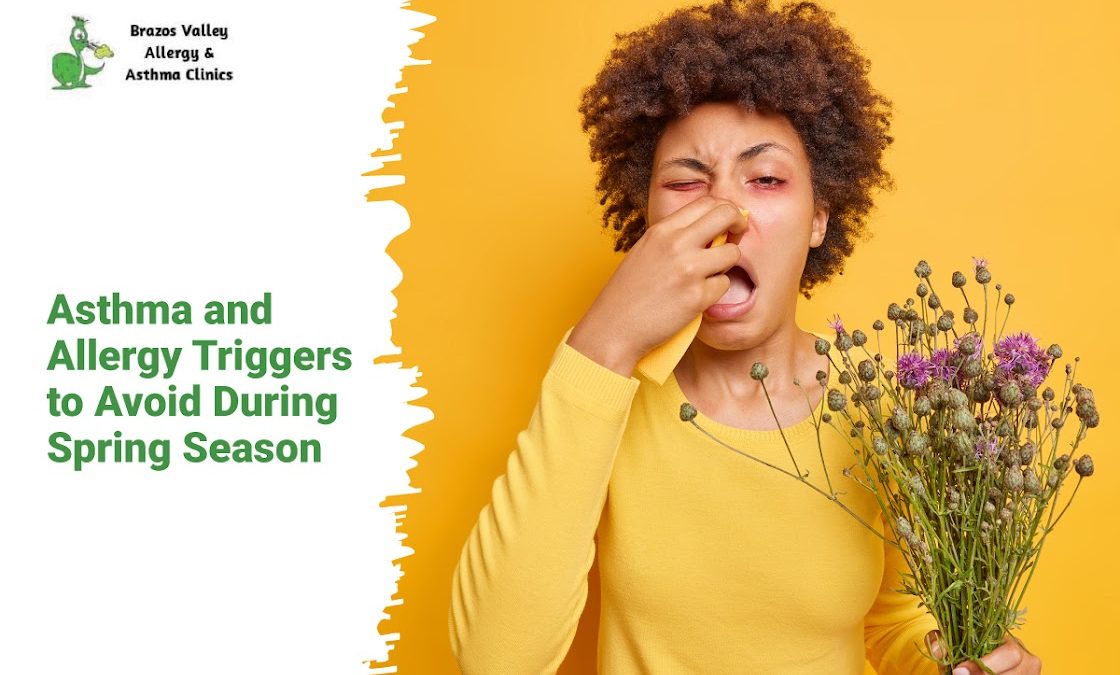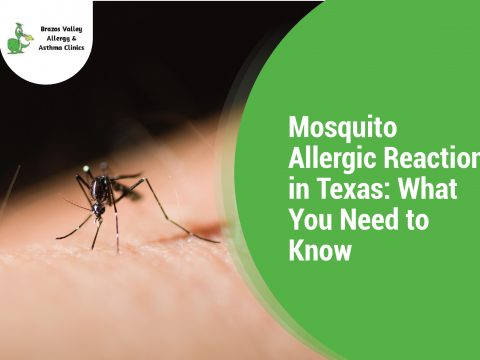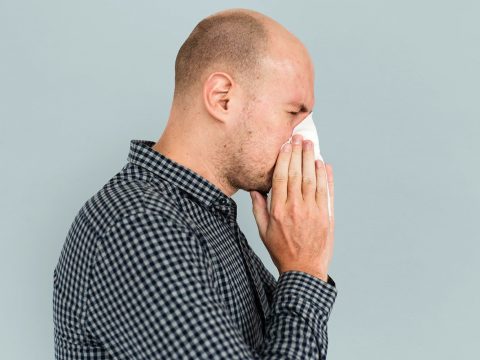- 979-485-9287
- office@bvallergy.com
-
 979-251-7804
979-251-7804
Asthma and Allergy Triggers to Avoid During Spring Season

Foods to Avoid for Asthma and Allergy Sufferers
May 31, 2023
Indoor Triggers: Creating an Allergy-Friendly Home Environment
July 10, 2023Spring is often considered as the season of rebirth and renewal. But for people with asthma and allergies, it can be a challenging time. Increasing pollen, mold spores, and other airborne allergens can trigger asthma attacks and allergic reactions. If you have a hard time during spring because of seasonal allergies, you’re on the right page.
This article will discuss the most common asthma and allergy triggers during the spring season and how to avoid them. If you have trouble breathing because of allergies and asthma, continue reading to learn more.
Understanding Asthma and Allergies
Before we dive into the specific triggers, it’s essential to understand what allergies and asthma are. Asthma is a chronic health disorder that causes inflammation and airway narrowing. It makes breathing difficult. On the other hand, allergies occur when your body’s natural defense (immune system) overreacts to a harmless substance. These substances are pollen, dust mites, or pet dander.
Spring Allergies: Common Triggers and Prevention
Allergies during spring can be caused by several types of allergens. Below are some of the most common spring allergy triggers and tips to prevent them.
Pollen
Pollen is a fine powder-like substance produced and released by trees, grasses, and weeds to fertilize other plants of the same species. During spring allergy season, pollen counts tend to rise, causing sneezing, itchy eyes, and runny noses (symptoms of spring allergies). To prevent spring pollen allergies, try the following:
- Learn the pollen count in your area and stay indoors when it’s high.
- Keep windows and doors closed during the pollen season.
- Buy an AC with a HEPA filter to purify the air.
- Avoid outdoor activities during peak pollen hours (usually mid-morning to early afternoon).
Mold
Mold is a fungus that develops and thrives in cold, damp, and humid environments. In springtime, mold spores can be found in decaying leaves, soil, and other outdoor areas. Mold exposure can trigger asthma and allergy symptoms. Here are some tips to prevent mold allergies:
- Keep indoor humidity levels below 50% to prevent mold growth.
- Fix any water leaks or damp areas in your home.
- Use a dehumidifier to reduce indoor humidity.
- Clean your bathroom and kitchen with mold-killing products.
Dust Mites
Dust mites are tiny critters that live in fabrics inside your house. They can trigger allergic reactions such as sneezing, runny nose, and itchy eyes. To prevent dust mite allergies, follow these tips:
- Use hypoallergenic bedding and pillowcases.
- Wash your bedding and curtains in hot water weekly.
- Vacuum your carpets and furniture regularly.
- Use a HEPA filter when vacuuming.
Animal Dander
Animal dander is a common allergen that can cause asthma and allergy symptoms. Even if you don’t own a pet, you can still be exposed to animal dander in public places or on other people’s clothes. To prevent animal dander allergies, try these tips:
- Avoid contact with pets, especially cats and dogs.
- If you own a pet, keep it out of your bedroom.
- Use a HEPA air purifier inside your home.
- Wash your hands after petting animals.
Asthma Triggers: Common Causes and Prevention
Asthma triggers are substances or conditions that cause asthma symptoms. The common seasonal asthma symptoms are wheezing, coughing, and shortness of breath. Here are some common spring asthma triggers and how to avoid them:
Outdoor Air Pollution
Air pollution from cars, factories, and other sources can worsen asthma symptoms. To prevent exposure to outdoor air pollution, try the following:
- Check the air quality index in your area and stay indoors when it’s high.
- Use a face mask to filter out pollution when outdoors.
- Avoid exercising near busy roads or during peak traffic hours.
Indoor Air Pollution
Indoor air pollution can also trigger asthma symptoms. Familiar sources of indoor air pollution include cigarette smoke, cooking fumes, and cleaning products. Here are some tips to reduce indoor air pollution:
- Don’t allow smoking indoors.
- Use natural cleaning products or those labeled “asthma-friendly.”
- Use an exhaust fan or open windows when cooking.
- Have your home’s ventilation system inspected and cleaned regularly.
Respiratory Infections
Respiratory infections like the flu and colds can trigger asthma symptoms. To prevent respiratory infections, try these tips:
- Frequently wash your hands using soap and water.
- Avoid close contact with sick individuals.
- Get vaccinated against the flu and pneumonia.
- Stay home when you’re sick to avoid spreading germs.
Takeaway
Spring is a challenging time for people with asthma and allergies. Still, knowing the common triggers and how to avoid them can reduce your symptoms and help you enjoy the season. Remember to check the pollen count, keep your home clean and dry, and take steps to prevent respiratory infections. By following these tips, you can breathe easily and enjoy the beauty of spring.
FAQs To Help Better Understand Asthma and Allergy Triggers During Spring
- Can allergies cause asthma?
Yes, allergies can trigger asthma symptoms in some people. - What are the common spring allergy triggers?
The most common spring allergy triggers are pollen, mold, dust mites, and pet dander. - How can I reduce my exposure to pollen during the spring season?
You can minimize accidental exposure to pollen by checking the pollen count, keeping your windows and doors closed, using an air conditioner with a HEPA filter, and avoiding outdoor activities during peak pollen hours. - Can indoor air pollution worsen asthma symptoms?
Yes, indoor air pollution from cigarette smoke, cooking fumes, and cleaning products can trigger asthma symptoms. - What should I do if I have an asthma attack?
During an asthma attack, use your quick-relief inhaler, stay calm, and seek medical attention if your symptoms don’t improve.
Enjoy Springtime With Your Loved Ones Free of Asthma and Allergies
Allergy and asthma management starts with accurate testing. Our board-certified allergists at the south-central Texas region, Brazos Valley Allergy & Asthma Clinics, provide proper allergy testing to treat your condition. We aim to help you achieve an allergy-free life to enjoy springtime without worrying about experiencing asthma or allergies.
Start your allergy-free life by clicking this link.




